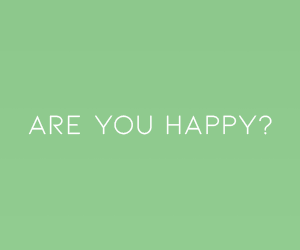This post is also available in Greek
There is no Greek who lives here in the Netherlands, that wouldn’t want the companionship of his best friend back home. In Greece when you were feeling lonely, your friends were a doorstep or a phone call away. You only had to wear your slippers, get your cell phone and "migrate" at their houses, often even without asking them.
You were getting into your car, which was parked less than 50 meters from the entrance of your house, and in half an hour at the most, you were in the arms of the people you choose to share your moments.

This, was happening back in Greece. Here, you carry 24/7 your agenda under your armpit, you have 5 different apps for not losing appointments you booked two weeks later and you have your mobile connected to the socket, in order to save what is left of your social life.
The price to get close to people who can understand you is cycling in the rain, against the wind or a couple of trams, a few buses busses and a costly ticket. This is the first thing your best friend didn’t tell you. That here, most of your time you will spend it alone.
Loneliness and depression are things you will experience, even if you decide to ignore them. In Greece you had your friends and the sun to renew you and comfort you. Here this work is been done by psychologists, weed, Heineken and the fear of going back.
This is why your buddy wanted you here. He thought that by bringing you here he would be no longer alone among strangers.

And here the game of misinformation begins.
Lie no1. All wages are high and you will also be able to save money
The truth: Truth is that good salaries are been given in the Netherlands. The thing you don’t know is that your salary will automatically be cutten in 3 pieces and 1 piece will go directly to the IRS. Brutto (gross) and Netto (pure) are two words you should be familiar before you starting signing contracts.
Check an example here:
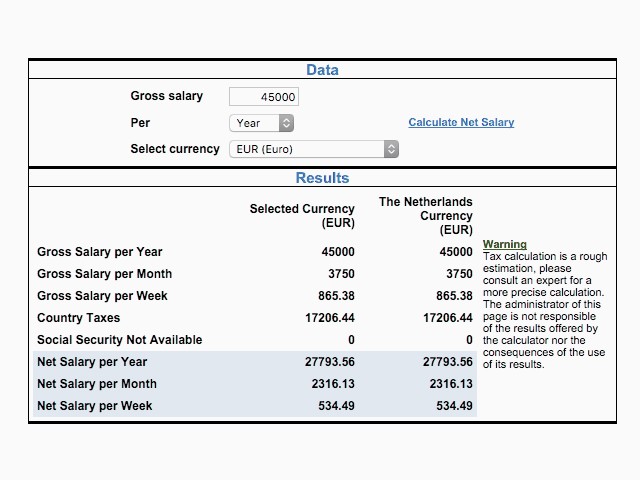
Calculate here
The good salaries are not given to everyone but only to those who stand out and have great experience or special knowledge. Here there is also undeclared work, zero hour contracts and exploitation, mainly in the HORECA sector (restaurants, cafes).
Tip: Do a good market research before you decide to come work in the Netherlands. Check when your specialty has job openings, what salaries are given and if you can afford the cost of life. If you decide to work in the field of HORECA, ask for a contract, read really carefully the terms and do research about the place you might be working, in order to know the conditions in advance.
Lie no2. There are many english spoken job openings
Truth: In the Netherlands there are some Job openings for only english speakers. There are, if you have a good degree or a strong professional backgrounds and you speak fluent English. Then you can be one of the lucky ones who will be employed in one of the not so many multinational companies.
Tip: Do not come here thinking that while working as a waiter, you will be able to look for a regular job. The jobs for beginners are hard to find since everyone is looking for one, pays very little usually and makes you spend your valuable time and money. Most of the time until you find a regular job you have empty pockets and zero psychology.
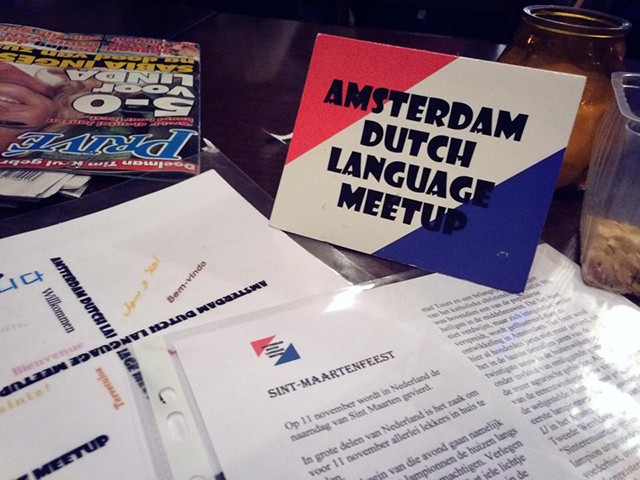
Lie no3. Everyone is speaking english and you don’t need to learn the language (dutch)
English is spoken pretty much everywhere in Amsterdam. Also in Utrecht, in Rotterdam, in Den Haag and Leiden…. and that’s it. In the rest of the Netherlands you are not really welcome if you don’t speak the language and english speaking job positions are few.
Tip: If you came here to stay permanently, start learning the language from the first month. Knowing it will be useful and will help you communicate, make friends and understand the lifestyle and the mentality. It will save you money from fines and misunderstandings but will also help you to understand the vast bureaucracy of the Netherlands. So, add it on your schedule!

Lie no4. Dutch language is easy and you will learn it fast
The truth: To learn the language at a professional level you need 1 to 2 years, a lot of money for lessons and daily effort. The language is mostly spoken and in order to learn it you have to talk with locals. Locals, on the other hand, don’t show any willingness to teach your their language and they switch to English immediately, when they realise that you are a foreigner, sometimes even before you open your mouth.
Tip: In the Netherlands either you speak the language at a professional level or you don’t. Nobody will hire you because you speak and understand the basics. Until you reach the desired level, take courses, speak with the locals, watch TV and take free online courses on the internet. The dutch language requires a lot of studying and practise, in order to be able to understand expressions and different accents.
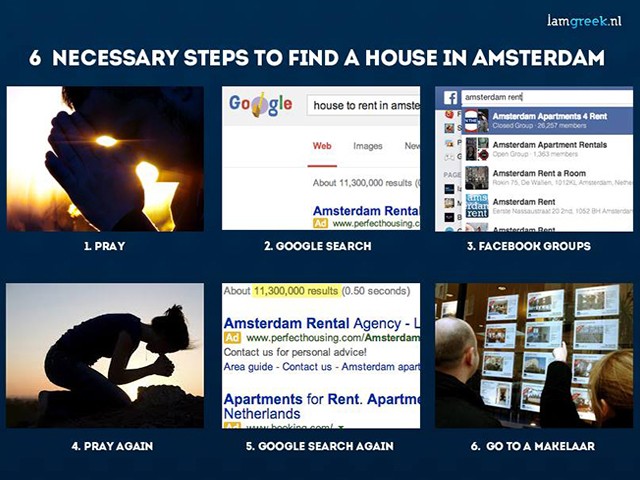
Lie no 5. I'll register you in my address
The truth: One of the biggest problems in the Netherlands is housing and getting a BSN (registration with the municipality). To get a BSN you must have a home address in the Netherlands, a house or a room in your name. There are cases that your buddy can register you at his address, if the house is under his name or his landlord willing to do it. Most times though registering a friend is not as simple as it seems or even possible.
Tip: If you get this kind offer from a friend, have him or her check if they can really register you in their house and if not, how long you can live there, until you can find a legal address (home or room) that you will be able to register.
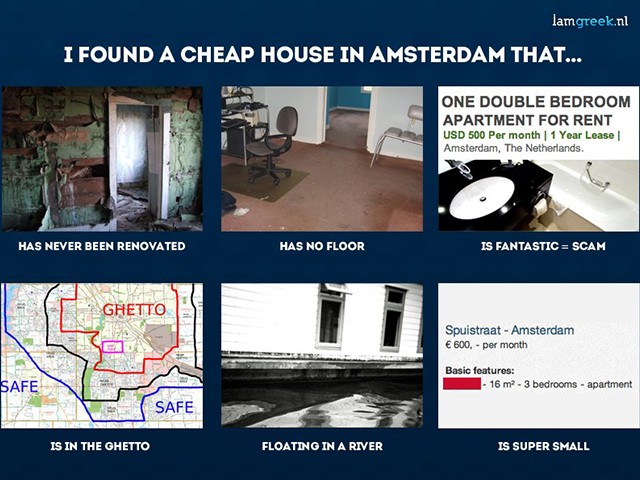
Lie no 6. You do not need a lot of money to start with since in the beginning you can live with me
The truth: In the beginning you will find yourself facing costs that you hadn’t calculate. Beyond the expensive rents, you might need to pay a rental agent to get you a house. Rental agents cost 1 rent + VAT (21%) and the contract costs around 200 euros. You might also be asked to pay in advance 1 to 3 rents if you don’t have good employment contract or fill certain requirements.
Each month you are also obligated to pay for your personal health insurance. Fees range from 80 to 120 euro for basic contracts. You pay health insurance from the first day you register at the municipality. If you get insured after that date, you will still pay retroactively the fees. So don’t delay it, thinking that you will save some money or that you don’t need to be insured.
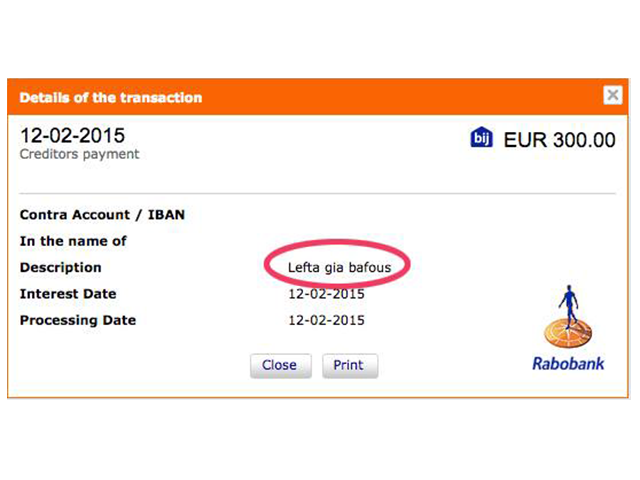
Tip: Don’t come to the Netherlands with 2000 euro into your pocket. Lifestyle is very expensive and even if you live at a friends house without paying rent, you will still need enough money until you manage to stand on your feet. Do not "smoke" and do not "drink" all your money in the beginning. First, find a job and then feel free to party with no regrets.
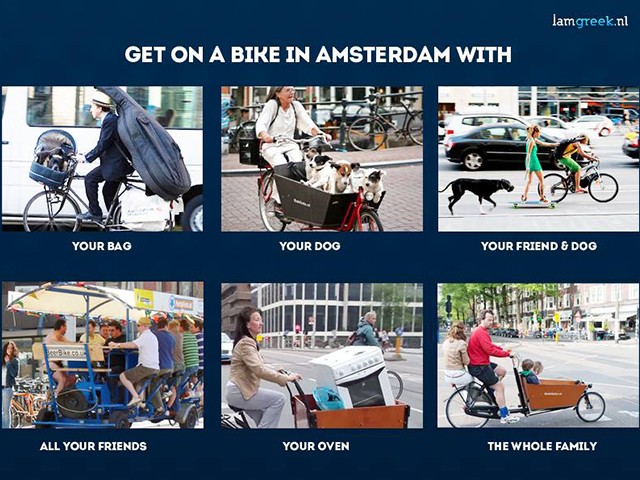
Lie no 7. Everyone is biking and public transportation works perfect
The truth: All Dutch people are bicycling. And they are doing it since they were 5 years old, every day, in the rain, with crosswind, light jackets, cigarette in one hand, mobile phone on the other and they do not even get sick. On the other hand, you did this with a car, closed windows and the radiator blasting heat. If you want to do it the Dutch way, at least, do it well dressed, as a Greek, because flu, pneumonia and Dutch cyclists are hazardous for your health.
In case you decide that biking is not for you, you can use public transportation. There are times when the busses and trams don’t show up and trains are delayed or cancelled but most of the time you are on time for your appointment, easy, fast but not cheap.
Tip: Come prepared to bike in very bad weather conditions and keep in mind that there are days that biking is not even an option because of the weather. So travelling with public transportation, and trains is the your only other option.
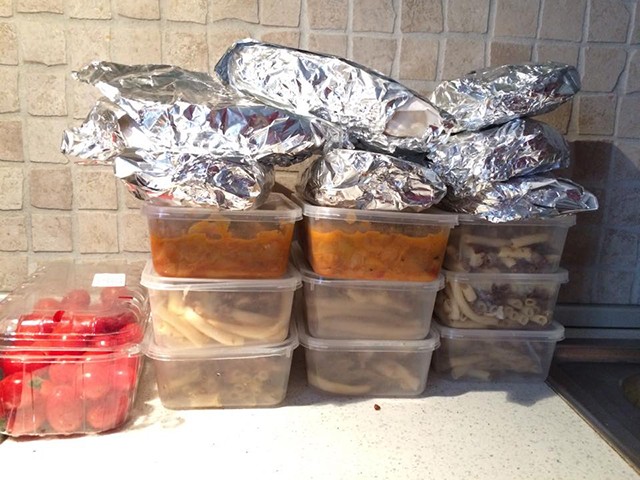
Lie no 8. Take out food and shopping at the market are cheap
The truth: Food in the Netherlands is admittedly unacceptable. To eat well you have 2 options, cook it by yourself or pay 30 euro at least per person. The supermarket is very cheap and has pre cooked food, but the taste and quality are far below the food we used to eat back in Greece. The worst sandwich shop in Thessaloniki had better food than the best fast food in Amsterdam (always on value, price and taste!).
Tip: Take whatever recipe you can from your mom, and get ready to learn how to cook, because otherwise you are going to starve.
Lie nο 9. There are good laws and the legal system works here
The truth: There are laws in the Netherlands and you will find justice more easily. However there are cases where the locals are playing the legal game better than you. Your boss might give you a contract with fewer hours or no hours, the house you rent might not even exist, the electricity company might ask you insane fees because somebody was stealing your power and your accountant might charge you 440 euros for a phone call. Where there are people and money, there is corruption, here is no different.
Tip: Always keep in your wallet a card from a lawyer, an accountant and a translator. Since you don’t know the language, you will get lost in translation too many times and you will need someone who knows it to get you out future messes.

Lie no 10. The Dutch are polite, there are no racists and they are animal lovers
The truth: The Dutch are weird people. They are a mixture of English, German and Greek. They can be very rude and they justify it as honesty. They are good traders and give great value to money. On the other hand they are open-minded, not shocked easily, they are polite in their daily life, calm, relaxed and they adore animals until the moment you tell them that you have a dog inside their house, which you rent.
Tip: Don’t get angry with the wrong views and opinions of local people on issues concerning your nationality and your country. Upon disagreement try to explain your way of thinking since you do actually know better. Still, avoid fights. Think that their main source of information is their news channels and newspapers.
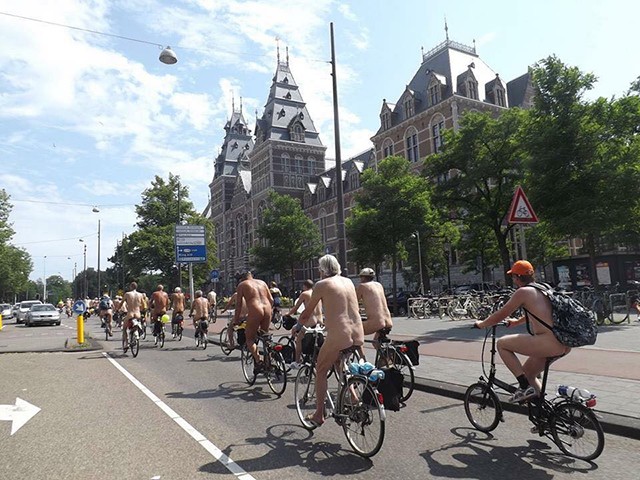
What else your friend didn’t tell you.
That for the house he is offering you to stay, he made the same effort to find it that you will and pays all the bills without asking you anything.
That he is willing to give you a big part of his free time to show you and teach you life here.
That he agreed to participate to the depression and despair that you will have as a beginner.
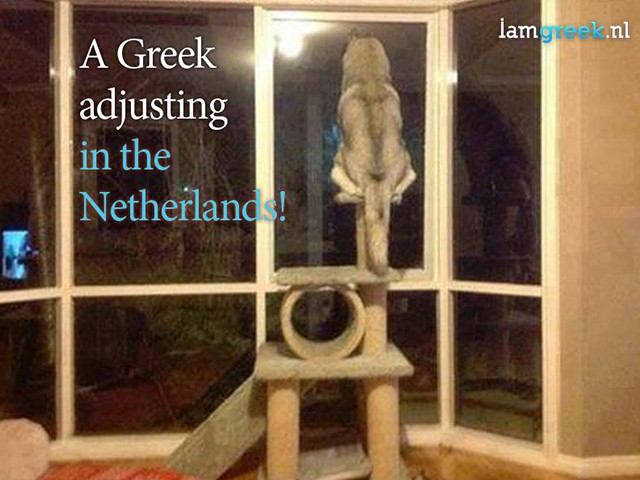
Patience, money, mood, time. This is what he gave you and expects nothing back, not even a thank you.
That's why when you enter his house, with all your dreams wrapped carefully inside the two suitcases you were able to carry, remember to weigh both the good and the bad.
If you want your friendship to exist after the first six months in the Netherlands, come here organized, with prepared resumes, a thirst to meet new people, to go out and search for a job, to discover new ways to spend your time, to find your own space and have your privacy.
Appreciate this opportunity.











